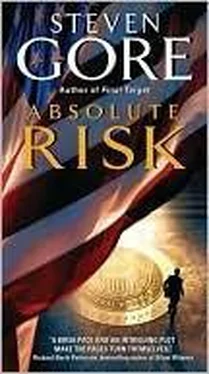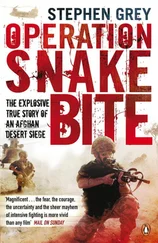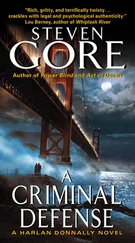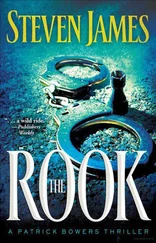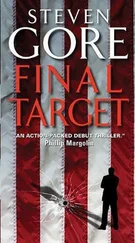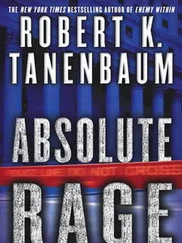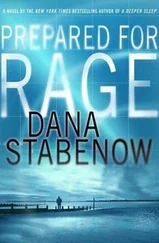Steven Gore - Absolute Risk
Здесь есть возможность читать онлайн «Steven Gore - Absolute Risk» весь текст электронной книги совершенно бесплатно (целиком полную версию без сокращений). В некоторых случаях можно слушать аудио, скачать через торрент в формате fb2 и присутствует краткое содержание. Жанр: Триллер, на английском языке. Описание произведения, (предисловие) а так же отзывы посетителей доступны на портале библиотеки ЛибКат.
- Название:Absolute Risk
- Автор:
- Жанр:
- Год:неизвестен
- ISBN:нет данных
- Рейтинг книги:5 / 5. Голосов: 1
-
Избранное:Добавить в избранное
- Отзывы:
-
Ваша оценка:
- 100
- 1
- 2
- 3
- 4
- 5
Absolute Risk: краткое содержание, описание и аннотация
Предлагаем к чтению аннотацию, описание, краткое содержание или предисловие (зависит от того, что написал сам автор книги «Absolute Risk»). Если вы не нашли необходимую информацию о книге — напишите в комментариях, мы постараемся отыскать её.
Absolute Risk — читать онлайн бесплатно полную книгу (весь текст) целиком
Ниже представлен текст книги, разбитый по страницам. Система сохранения места последней прочитанной страницы, позволяет с удобством читать онлайн бесплатно книгу «Absolute Risk», без необходимости каждый раз заново искать на чём Вы остановились. Поставьте закладку, и сможете в любой момент перейти на страницу, на которой закончили чтение.
Интервал:
Закладка:
“There are a hundred million migrant laborers over there,” Abrams said. “Another ten million added in the last year. Fleeing farms that can’t produce even enough to support the villages around them. An average wage of fifty cents a day, and their life expectancy is dropping as though the Chinese economy was collapsing instead of expanding.” He pointed at the cover. “If all the little wildfires come together, there’ll be a conflagration. I’d hate to see her caught in the middle of it.”
“Given the places I’ve spent my career,” Gage said, “I’m not in a position to issue warnings.” Even though he knew that there were many times when he wished he was. But that was between him and Faith alone.
Abrams rose and retrieved the coffeepot and refilled their cups.
“You’re a tougher man than me.” Abrams paused and gazed out of the window down toward Central Park. “I was afraid even to let Jeanine jog around the reservoir.” He shrugged and offered a weak smile. “Maybe that’s why she ran away altogether.”
“Have you heard from her lately?”
“Not since I was appointed chairman. Not even an e-mail after I was confirmed.”
Gage didn’t have to ask why. He knew Jeanine well enough to understand that for her it was like Abrams had become the high priest of a materialistic religion that, in words she’d written to Faith, reduced hope and fear to matters of cash value. And it wasn’t that Jeanine had become a new age mystic. It was that she could no longer see the man she’d married under the vestments of his office or hear the voice that had once known how to speak in words other than data.
“Has she filed for a divorce?” Gage asked.
Abrams shook his head. “And I haven’t either.”
Gage wondered whether Abrams’s anxiety over the twisted life of Michael Hennessy was an unconscious attempt to prove to himself he wasn’t the man his wife believed he’d become.
Abrams sat down again and slid a file folder across the table.
“This is all I’ve been able to gather up about the Ibrahim case,” Abrams said. “And there was something screwy about it. If the case was as real as the FBI said it was, he’d be doing life in Leavenworth.” His voice trailed away and his eyebrows furrowed as he stared down at the file. “I don’t get it.”
“Was Hennessy still trying to figure out whether Ibrahim was guilty of something,” Gage said, “or was he certain that Ibrahim had been framed and decided to go looking for him?”
“For what?” Abrams spread his hands. “To ask forgiveness? The facts are the facts. Hennessy could’ve just written a blog and posted it for the world to see: Dear Professor Ibrahim. So sorry. Give me a call and we’ll do lunch.”
Gage imagined Abrams’s wife cringing at Abrams’s drift into sarcasm, his method of protecting himself from experiencing Hennessy’s guilt and Ibrahim’s terror, but Gage chose neither to confront Abrams nor to participate.
“Maybe Hennessy was the kind of man who needed to do it face-to-face,” Gage said, trying to imagine the strivings of a human being he didn’t yet understand. “A message in a bottle won’t do for some people, they need to touch the hand of the person they’ve wronged.”
Abrams smiled. “You’re the only investigator in the world who thinks like that.” His smile faded and he squinted at Gage. “Doesn’t that get to you after a while? “
“What get to me?”
“Climbing inside other people’s minds.”
“That’s what you do, but inside hundreds of millions of them at once, instead of one at a time.”
“Not quite. I mostly see people once removed, out of a limousine window or through economic data.” Abrams’s face reddened. “Except it’s really a kind of self-created distortion. Economics isn’t a science, it’s fantasy adorned in jargon.”
Gage drew back, stunned and puzzled by the seeming non sequitur, the leap from Hennessy to Abrams’s professional self-doubt. Somehow everything had become wrapped together into a personal crisis, and Gage wasn’t sure why.
“Even behavioral finance,” Abrams said, “to which I devoted the best part of my life, is just a form of modern voodoo, a collection of anecdotes shrouded in mathematical equations.”
“I’m not sure what-“
Abrams elbowed his way past Gage’s attempt to return him to the problem that had brought them together.
“I’ll tell you what I’ve really learned and what no one wants to hear.” Abrams pounded the table with his forefinger. “No one. The markets are nothing but a form of gambling driven by fear and greed. And all of the world’s mainframes linked together couldn’t predict when one or the other will lead the charge.”
Abrams’s voice hardened as if he was arguing with a naive colleague, or with himself.
“A science that can’t predict anything isn’t a science. They shouldn’t give a Nobel Prize in economics. They should just make it a subcategory of literature.”
Abrams’s breath came hard as he ended his unintended speech. He stared at Gage, eyes blank, as if he was looking through him at something in the distance.
“I don’t understand what this has to do with Ibrahim,” Gage said.
Abrams didn’t answer for a moment, then blinked and shook his head.
“It’s just that I feel like I’m trapped in a labyrinth with no way out. People like me oversold ourselves to the public, and now I’m their poster boy even though I stopped selling the fantasy fifteen years ago.” Abrams tapped the folder. “And despite what happened to Ibrahim, I’m pissed at him because he was just another in an endless line of mathematicians and physicists who claimed that they could not only make economics into a hard science, but design real-world models to guide real investments for people to rely on for their retirements.”
“And you’re certain that he can’t.”
“When I went up to MIT for a symposium a few months ago, no one in the economics department-not even the ones who recruited him-could tell me what he’d been doing at the time of his arrest, or even for the five years before that. A quarter of a million dollars a year, and for all anyone knew, he could’ve spent the whole time meditating in his office.”
“Didn’t they examine his work afterward? “
“Everyone did. FBI. CIA. NSA. The department head told me that his equations read more like poetry than science.”
Gage flipped open the folder and turned the pages, skimming through a printout of Ibrahim’s old MIT faculty Web page from the Institute of Financial Engineering, his curriculum vitae, and news articles about his terrorist financing arrest and deportation.
“I don’t see anything here suggesting that he had an academic interest in structuring offshore transactions,” Gage said. “It’s all string theory and entanglements and quantum mechanics. I’m not sure what esoteric route takes a person from MIT, through the space-time continuum, and to the Cayman Islands. It strikes me that they’re in different dimensions.”
“That was one of the reasons his arrest was so shocking,” Abrams said. “The other was that he was completely apolitical. He was born in Saudi Arabia, but for him it wasn’t a country to which he bore any allegiance, only a position in space defined by latitude and longitude and time, and of no more significance than any other place.”
Abrams paused, and then smiled and said, “I once ran into Ibrahim at Shaw’s Market in Boston right after he came to MIT. He pointed at a picture of the globe on the side of a crate of fruit from Chile. He said that if there’s no real north and south in the universe, then why don’t we start making maps with what we call north at the bottom, or even lay the globe sideways.”
Читать дальшеИнтервал:
Закладка:
Похожие книги на «Absolute Risk»
Представляем Вашему вниманию похожие книги на «Absolute Risk» списком для выбора. Мы отобрали схожую по названию и смыслу литературу в надежде предоставить читателям больше вариантов отыскать новые, интересные, ещё непрочитанные произведения.
Обсуждение, отзывы о книге «Absolute Risk» и просто собственные мнения читателей. Оставьте ваши комментарии, напишите, что Вы думаете о произведении, его смысле или главных героях. Укажите что конкретно понравилось, а что нет, и почему Вы так считаете.
